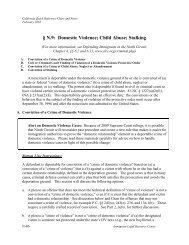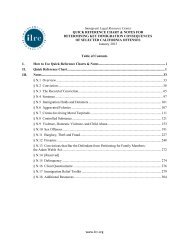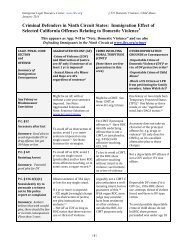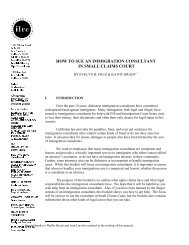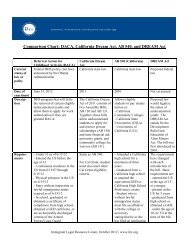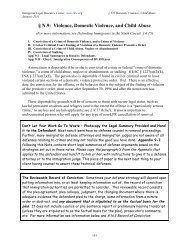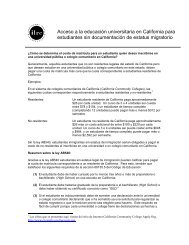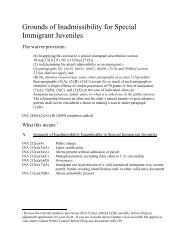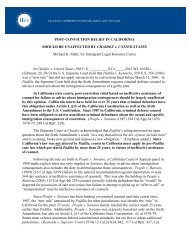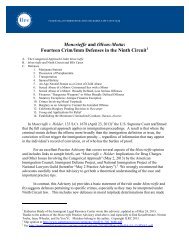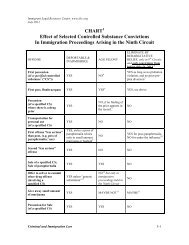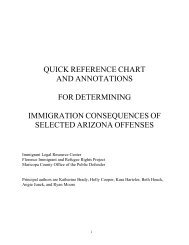Inspiring Leadership in Immigrant Communities - ILRC
Inspiring Leadership in Immigrant Communities - ILRC
Inspiring Leadership in Immigrant Communities - ILRC
- No tags were found...
Create successful ePaper yourself
Turn your PDF publications into a flip-book with our unique Google optimized e-Paper software.
<strong>Inspir<strong>in</strong>g</strong> <strong>Leadership</strong> <strong>in</strong> <strong>Immigrant</strong> <strong>Communities</strong>January 2003Lecture/Discussion: Decid<strong>in</strong>g whether and how media work will be helpful for your issue(15 m<strong>in</strong>utes)Will media work be helpful? To whom? Why? Whom will it affect? Could it potentially damageour allies or us? Who should ultimately decide?Example 1An undocumented woman is seriously exploited <strong>in</strong> her job. Her employer makes herwork twenty hours a day clean<strong>in</strong>g the house and tak<strong>in</strong>g care of the employer’s elderlyfather. The employer pays her only $50.00 a day plus room and board. The employer hasthreatened to call the INS if the woman compla<strong>in</strong>s about her job situation. An agencytry<strong>in</strong>g to help her has to decide whether do<strong>in</strong>g a press conference will be helpful, orwhether it might risk br<strong>in</strong>g<strong>in</strong>g her to the attention of the INS. The person or people whowould either benefit or suffer the most should ultimately decide whether to do mediawork around the issue.Example 2<strong>Immigrant</strong> service groups <strong>in</strong> San Francisco had two goals—promot<strong>in</strong>g naturalization andcriticiz<strong>in</strong>g the INS for process<strong>in</strong>g naturalization applications too slowly. Some decidedthat the media would be more <strong>in</strong>terested <strong>in</strong> a story criticiz<strong>in</strong>g the government. Others,however, warned that stories <strong>in</strong> the media about delays <strong>in</strong> naturalization woulddiscourage people from apply<strong>in</strong>g, which would defeat their other important goal.Decide exactly what aspect of the issue to feature, and pick an appropriate and sympatheticexample to use to illustrate it to the media.ExampleA 4-year-old may be a more appeal<strong>in</strong>g and sympathetic news subject than an adult whohas a history of crim<strong>in</strong>al problems. Often you want someth<strong>in</strong>g or someone sympathetic.Will the media be <strong>in</strong>terested <strong>in</strong> the issue? One way to f<strong>in</strong>d out is by call<strong>in</strong>g someone from themedia and ask<strong>in</strong>g. This is especially true if you have already established a contact with<strong>in</strong> themedia.Will publiciz<strong>in</strong>g the issue offend someone who could actually help you get what you want?ExampleAn agency decides to do a press conference criticiz<strong>in</strong>g the pr<strong>in</strong>cipal of a school forexpell<strong>in</strong>g the child of a leader. However, the agency was not aware that the PTA hadtaken on the leader’s cause and that the PTA felt that the pr<strong>in</strong>cipal was about to changeher m<strong>in</strong>d regard<strong>in</strong>g the leader. After the negative publicity, the pr<strong>in</strong>cipal decided to standher ground on expell<strong>in</strong>g the leader’s child. It is best to <strong>in</strong>vestigate the issues, the peopleconcerned, and what else is be<strong>in</strong>g done before go<strong>in</strong>g ahead with the conference.Decide whether you have the resources to do the press conferences. For example, is there aperson directly impacted by the issue who would be will<strong>in</strong>g to participate <strong>in</strong> the conference? Do6-3



